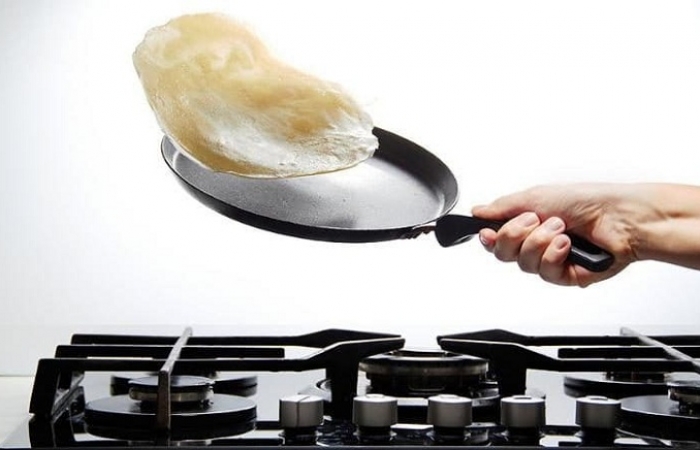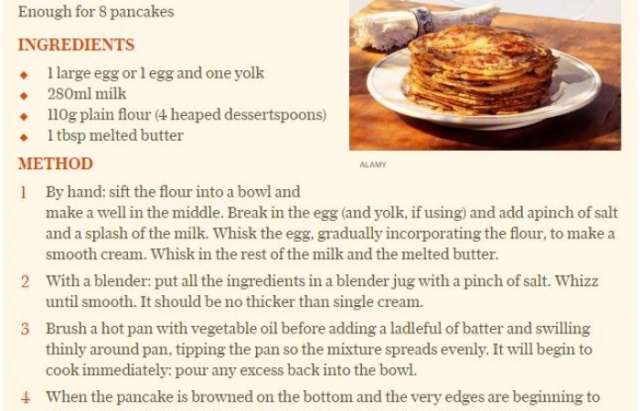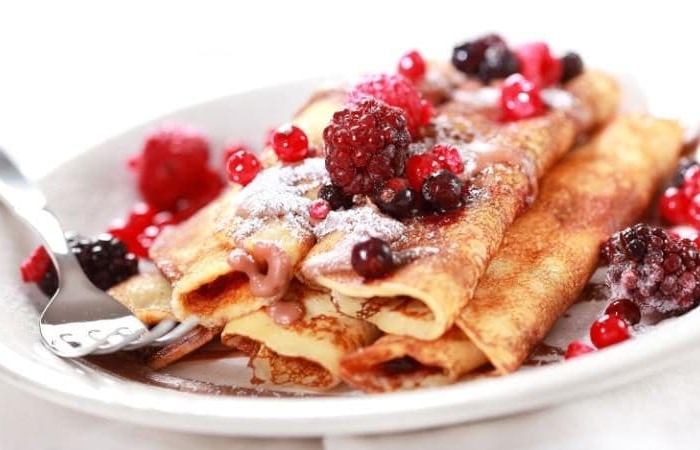Pancake Day has been celebrated by Britons for centuries. Known also as Shrove Tuesday, its exact date, rather confusingly, changes every year, because it is determined by when Easter falls.
But it is always the day preceding Ash Wednesday (the first day of Lent), and always falls in February or March. This year, you'll need to get your pans ready for Tuesday, February 28th.
What does Shrove Tuesday mean?
The word shrove is a form of the English word shrive, which means to obtain absolution for one's sins by way of confession and penance. Shrove Tuesday gets its name from the custom for Christians to be "shriven" before the start of Lent.
Why do we celebrate Pancake Day?
Traditionally, pancakes were eaten on this day to use up rich, indulgent foods like eggs and milk before the 40-day fasting season of Lent began. But although it is enshrined in Christian tradition, it is believed that Pancake Day might originate in a pagan holiday, when eating warm, round pancakes - symbolising the sun - was a way of celebrating the arrival of spring.
Why do we flip pancakes?

As well as making and eating pancakes, we Brits love to hold pancake races, where people run while flipping their pancakes in a pan. Legend has it that the tradition was born in the 15th century when a particularly disorganised woman in Buckinghamshire rushed to church to confess her sins while mid-way through making pancakes. We hope she gave one to the priest.

11 things you didn't know about pancakes
1. The largest pancake in the world was cooked up in Rochdale in 1994, weighing in at 6,614 lbs (that's three tonnes!) and measuring 49 ft and 3in long.
2. If you feel guilty about using readymade pancake mix, don't worry - people have been doing it forever. Aunt Jemimas was invented in St Joseph, Missouri in 1889 and is claimed to be the first ever readymade pancake mixture to be sold.
3. The world's largest pancake breakfast was held in Springfield, America, in 2012. The breakfast saw 15,000 people get together in Main Street to enjoy a huge number of pancakes and raised $10,000 for a local charity.
4. Pancake races happen all over England throughout Shrove Tuesday. The tradition is thought to have originated in Olney in the 15th century, after a woman lost track of time while cooking pancakes. When the bells for mass rang, she ran out of her house with the pan and pancake still in hand. Olney still holds a pancake race every year.
5. The largest number of pancake flips in the shortest amount of time is currently 349 flips in two minutes, a record achieved by Dean Gould in Felixstowe, Suffolk, in 1995.
6. While we in Britain tend to keep our pancake ingredients nice and simple, in Newfoundland, Canada, objects with symbolic value are added to the batter to be cooked. These items are then used to interpret different messages about the future - for example, a pancake served with a ring inside may signify marriage.
7. In France, it is traditional while flipping a pancake to hold a coin in one hand and to make a wish.
8. The largest stack of pancakes ever cooked was made up of 60 pancakes and was an impressive 76cm tall.
9. It is estimated that an impressive 52 million eggs are used in Britain each year on pancake day - that's 22 million more than every other day of the year.
10. On Pancake Day in Scotland the locals like to eat "festy cock". The word festy is linked to Festern's E'en, the day before Shrove Tuesday, when cock fighting took place. You make the dish by rolling out a ball of finely ground oatmeal and folding it into a rough bird shape before baking and eating as a substitute for a cockerel.
11. The French call pancake day Mardi Gras, or Fat Tuesday. This originates from the ancient ritual of parading a large ox through Paris to remind people that meat was forbidden during the Lent period.
/The Telegraph/
More about: #Pancakeday
















































